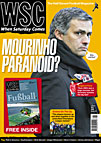 As we reach the end of the season is the Premier League the most unpredictable league?
As we reach the end of the season is the Premier League the most unpredictable league?
Looking at the tables as the end of the season approaches, it might occur to you that, with very few exceptions, no one really knows anything. Passages of play in matches have been described as little more than a series of random events, their final outcome decided by whoever is able to impose a distinct pattern, which more often than not neither side manages to do. This season, the same sense of galumphing randomness has applied to the football predictions business. Never before have the forecasts for how the season will pan out come so badly unstuck – the confident assertions made in tabloid and broadsheet columns and TV discussions may as well be seen in same light as contributions to the astrology page.